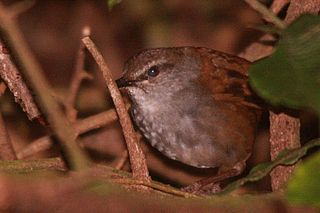
The Sulawesi bush warbler is a species of Old World warbler in the family Locustellidae. It is endemic to the island of Sulawesi in Indonesia where it is found on the forest floor.

The golden-mantled racket-tail is a species of parrot in the family Psittaculidae. It is endemic to Indonesia. Its natural habitats are subtropical or tropical moist lowland forest and subtropical or tropical moist montane forest up to an altitude of about 3,000 metres (9,800 ft).
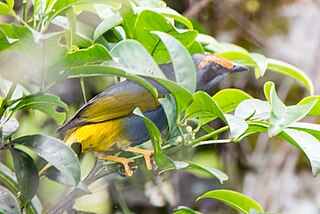
The fiery-browed starling or fiery-browed myna is a species of starling in the family Sturnidae. It is monotypic within the genus Enodes. Distinguished by a reddish-orange stripe over the eye, it is endemic to the Indonesian island of Sulawesi, mainly living in humid highland forest.

The Sulawesi masked owl is a species of owl in the family Tytonidae. It is endemic to the Indonesian islands of Sulawesi, Sangihe and Peleng. It is listed by the IUCN as being of least concern.

The moustached kingfisher, also called Bougainville moustached kingfisher, is a species of bird in the family Alcedinidae. It is endemic to Bougainville Island in Papua New Guinea. An estimated 250–1,000 mature individuals are left.

The rufous-collared kingfisher is a species of bird in the family Alcedinidae. It is found in Brunei, Indonesia, Malaysia, Myanmar, and Thailand. Its natural habitats are subtropical or tropical moist lowland forest and subtropical or tropical moist montane forest. It is threatened by habitat loss.

Hombron's kingfisher or the blue-capped kingfisher is a species of bird in the family Alcedinidae endemic to the Philippines and found only on Mindanao. It is one of the most colorful kingfishers in the country having a dark blue cap and wings with rufous spots, a striped rufous belly, white chin and red bill. Its natural habitats are on the upper ranges of tropical moist lowland forest and tropical moist montane forests. It is threatened by habitat loss.
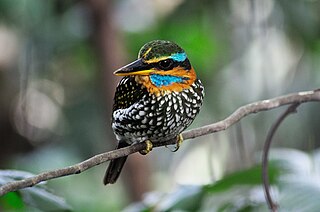
The spotted wood kingfisher or spotted kingfisher is a species of bird in the family Alcedinidae. It is endemic to the Philippines where its natural habitat is subtropical or tropical moist lowland forests.
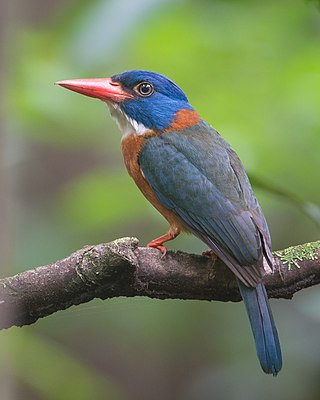
The green-backed kingfisher is a species of bird in the family Alcedinidae endemic to Indonesia, where it is restricted to north and central Sulawesi, and the islands of Manadotua and Lembeh. It can be found in the protected areas of Lore Lindu, Bogani Nani Wartabone, and Tangkoko Batuangus.

The mountain kingfisher is a species of bird in the subfamily Halcyoninae in the family Alcedinidae. Adult males are 21–24 cm (8.3–9.4 in) long, and have a rufous head and underparts, greenish-blue upperparts, a dark blue tail, and black flight feathers. They also have dark neck patches and loral patches. Females have dark crowns and the neck patches join at the nape. It is similar to the yellow-billed kingfisher, but can be distinguished by its larger size and a proportionally larger bill, along with a dark ridge along its culmen.

Winchell's kingfisher or the rufous-lored kingfisher, is a species of bird in the family Alcedinidae, the kingfishers. It is endemic to the Philippines, its natural habitat being lowland forests. It is threatened by deforestation, and the International Union for Conservation of Nature (IUCN) has assessed it as a vulnerable species.

The cerulean cuckooshrike is a species of bird in the family Campephagidae. It is endemic to the island of Sulawesi in Indonesia. Its natural habitats are subtropical or tropical moist lowland forest and subtropical or tropical moist montane forest. Other common names for this bird include the Sulawesi cuckooshrike, the Celebes cuckooshrike and Temminck's cuckooshrike.

The Matinan blue flycatcher, also known as the Matinan flycatcher, is a species of bird in the family Muscicapidae. It is endemic to the island of Sulawesi in Indonesia. Its natural habitat is subtropical or tropical moist montane forests, and the species is threatened by habitat loss.
The great shortwing is a species of bird in the family Muscicapidae, and the only member of its genus. Other common names include giant shortwing, Celebes shortwing and Sulawesi shortwing. It is endemic to Sulawesi in Indonesia where its natural habitat is tropical moist montane forests.

The dark-eared myza, also known as the lesser streaked honeyeater, is a species of bird in the family Meliphagidae. It is endemic to the island of Sulawesi in Indonesia. There are two subspecies, Myza celebensis celebensis which is found in mountainous parts of northern, central and southeastern Sulawesi, and Myza celebensis meridionalis from mountains in southern Sulawesi.

The Philippine pygmy woodpecker, also known as the Philippine woodpecker, is a species of bird in the woodpecker family (Picidae). Its local name in Kapampangan is Anluage.

The ashy woodpecker is a species of bird in the woodpecker family Picidae. It is endemic to Sulawesi and surrounding islands in Indonesia. There are two subspecies, the nominate race M. f. fulvus, which is found in northern Sulawesi, the islands of Lembeh and Manterawu, and the archipelagos of Togian and Banggai; and M. f. wallacei, from southern Sulawesi and the islands of Muna and Buton. The second subspecies is named for the collector and scientist Alfred Russel Wallace.

Gunung Ambang Nature Reserve is a preserved area in the north of the island of Sulawesi in Indonesia. It is in a mountainous, little-explored region and contains a large number of indigenous plants and animals.
The plain-backed kingfisher is a kingfisher in the subfamily Halcyoninae that is endemic to southeastern Sulawesi in Indonesia. It is known from two specimens from interior montane forests at an elevation around 2,000 m. It is likely threatened by ongoing deforestation.
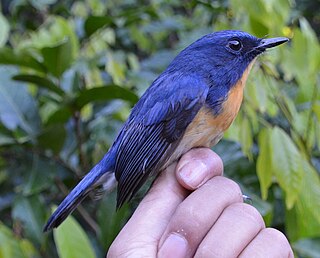
The Meratus blue flycatcher is a species of bird in the Old World flycatcher family, Muscicapidae. The species was described in 2021 by the Indonesian ornithologist Mohammed Irham and his colleagues, based on genetic, morphological, and vocal differences with other Cyornis flycatchers. It is endemic to the Meratus Mountains of Indonesian Borneo, where it has been recorded only from Mount Besar. It is most common at elevations between 900 and 1,300 m and inhabits montane rainforest, secondary forest, and rubber plantations. It is sexually dimorphic like other species in its genus; males have blue upperparts, iridescent blue patches on the forehead and shoulders, and orange-and-white underparts, while females have gray-brown heads and upperparts. They have a length of 15.7–16.0 cm (6.2–6.3 in); males weigh 18.5–19.75 g (0.653–0.697 oz) and females weigh 15.75–20.0 g (0.556–0.705 oz).
























